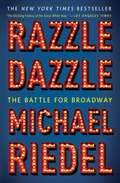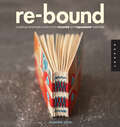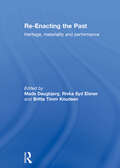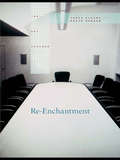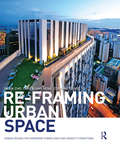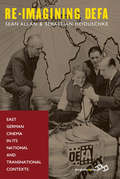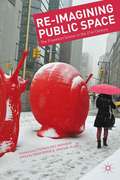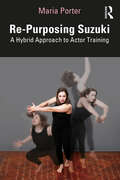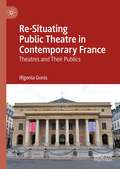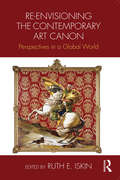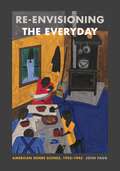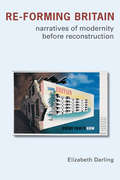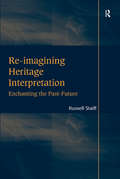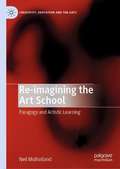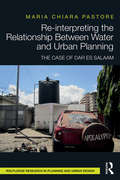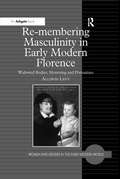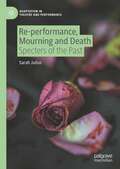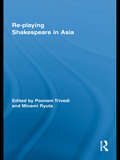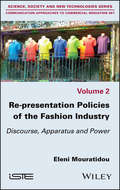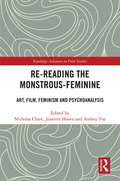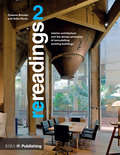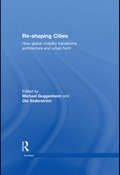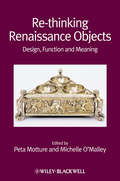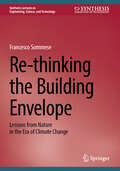- Table View
- List View
Razzle Dazzle: The Battle for Broadway
by Michael Riedel&“A vivid page-turner&” (NPR) detailing the rise, fall, and redemption of Broadway—its stars, its biggest shows, its producers, and all the drama, intrigue, and power plays that happened behind the scenes.&“A rich, lovely, debut history of New York theater in the 1970s and eighties&” (Kirkus Reviews, starred review), Razzle Dazzle is a narrative account of the people and the money and the power that turned New York&’s gritty back alleys and sex-shops into the glitzy, dazzling Great White Way. In the mid-1970s Times Square was the seedy symbol of New York&’s economic decline. Its once shining star, the renowned Shubert Organization, was losing theaters to make way for parking lots and losing money. Bernard Jacobs and Jerry Schoenfeld, two ambitious board members, saw the crumbling company was ripe for takeover and staged a coup and staved off corporate intrigue, personal betrayals and criminal investigations. Once Jacobs and Schoenfeld solidified their power, they turned a collapsed theater-owning holding company into one of the most successful entertainment empires in the world, spearheading the revitalization of Broadway and the renewal of Times Square. &“For those interested in the business behind the greasepaint, at a riveting time in Broadway&’s and New York&’s history, this is the ticket&” (USA TODAY). Michael Riedel tells the stories of the Shubert Organization and the shows that re-built a city in grand style—including Cats, A Chorus Line, and Mamma Mia!—revealing the backstage drama that often rivaled what transpired onstage, exposing bitter rivalries, unlikely alliances, and inside gossip. &“The trouble with Razzle Dazzle is…you can&’t put the damn thing down&” (Huffington Post).
Re-Bound: Creating Handmade Books from Recycled and Repurposed Materials
by Jeannine SteinA DIY book making guide that repurposes easily-found items into handcrafted books, perfect for gift giving.Re-Bound is a beautiful book on bookbinding with a fun green twist—all the projects use recycled and upcycled materials. This book shows you how to take everyday materials from around the house, flea markets, thrift stores, and hardware stores and turn them into clever and eye-catching hand-made books.
Re-Dressing the Canon: Essays on Theatre and Gender
by Alisa SolomonRe-Dressing the Canon examines the relationship between gender and performance in a series of essays which combine the critique of specific live performances with an astute theoretical analysis. Alisa Solomon discusses both canonical texts and contemporary productions in a lively jargon-free style. Among the dramatic texts considered are those of Aristophanes, Ibsen, Yiddish theatre, Mabou Mines, Deborah Warner, Shakespeare, Brecht, Split Britches, Ridiculous Theatre, and Tony Kushner. Bringing to bear theories of 'gender performativity' upon theatrical events, the author explores: * the 'double disguise' of cross-dressed boy-actresses * how gender relates to genre (particularly in Ibsens' realism) * how canonical theatre represented gender in ways which maintain traditional images of masculinity and femininity.
Re-Enacting the Past: Heritage, Materiality and Performance
by Mads Daugbjerg, Rivka Syd Eisner and Britta Timm KnudsenWhat is re-enactment and how does it relate to heritage? Re-enactments are a ubiquitous part of popular and memory culture and are of growing importance to heritage studies. As concept and practice, re-enactments encompass a wide range of forms: from the annual ‘Viking Moot’ festival in Denmark drawing thousands of participants and spectators, to the (re)staged war photography of An-My Lê, to the Titanic Memorial Cruise commemorating the centennial of the ill-fated voyage, to the symbolic retracing of the Berlin Wall across the city on 9 November 2014 to mark the 25th anniversary of its toppling.Re-enactments involve the sensuousness of bodily experience and engagement, the exhilarating yet precarious combination of imagination with ‘historical fact’, in-the-moment negotiations between and within temporalities, and the compelling drive to re-make, or re-presence, the past. As such, re-enactments present a number of challenges to traditional understandings of heritage, including taken-for-granted assumptions regarding fixity, conservation, originality, ownership and authenticity. Using a variety of international, cross-disciplinary case studies, this volume explores re-enactment as practice, problem, and/or potential, in order to widen the scope of heritage thinking and analysis toward impermanence, performance, flux, innovation and creativity.This book was originally published as a special issue of the International Journal of Heritage Studies.
Re-Enchantment (The Art Seminar)
by David Morgan James ElkinsThe near-absence of religion from contemporary discourse on art is one of the most fundamental issues in postmodernism. Artists critical of religion can find voices in the art world, but religion itself, including spirituality, is taken to be excluded by the very project of modernism. The sublime, "re-enchantment" (as in Weber), and the aura (as in Benjamin) have been used to smuggle religious concepts back into academic writing, but there is still no direct communication between "religionists" and scholars. Re-Enchantment, volume 7 in The Art Seminar Series, will be the first book to bridge that gap. The volume will include an introduction and two final, synoptic essays, as well as contributions from some of the most prominent thinkers on religion and art including Boris Groys, James Elkins, Thierry de Duve, David Morgan, Norman Girardot, Sally Promey, Brent Plate, and Christopher Pinney.
Re-Framing Urban Space: Urban Design for Emerging Hybrid and High-Density Conditions
by Im Sik Cho Chye-Kiang Heng Zdravko TrivicRe-framing Urban Space: Urban Design for Emerging Hybrid and High-Density Conditions rethinks the role and meaning of urban spaces through current trends and challenges in urban development. In emerging dense, hybrid, complex and dynamic urban conditions, public urban space is not only a precious and contested commodity, but also one of the key vehicles for achieving socially, environmentally and economically sustainable urban living. Past research has been predominantly focused on familiar models of urban space, such as squares, plazas, streets, parks and arcades, without consistent and clear rules on what constitutes good urban space, let alone what constitutes good urban space in ‘high-density context’. Through an innovative and integrative research framework, Re-Framing Urban Space guides the assessment, planning, design and re-design of urban spaces at various stages of the decision-making process, facilitating an understanding of how enduring qualities are expressed and negotiated through design measures in high-density urban environments. This book explores over 50 best practice case studies of recent urban design projects in high-density contexts, including Singapore, Beijing, Tokyo, New York, and Rotterdam. Visually compelling and insightful, Re-Framing Urban Space provides a comprehensive and accessible means to understand the critical properties that shape new urban spaces, illustrating key design components and principles. An invaluable guide to the stages of urban design, planning, policy and decision making, this book is essential reading for urban design and planning professionals, academics and students interested in public spaces within high-density urban development.
Re-Imagining DEFA: East German Cinema in its National and Transnational Contexts
by Sebastian Heiduschke Seán AllanBy the time the Berlin Wall collapsed, the cinema of the German Democratic Republic—to the extent it was considered at all—was widely regarded as a footnote to European film history, with little of enduring value. Since then, interest in East German cinema has exploded, inspiring innumerable festivals, books, and exhibits on the GDR’s rich and varied filmic output. In Re-Imagining DEFA, leading international experts take stock of this vibrant landscape and plot an ambitious course for future research, one that considers other cinematic traditions, brings genre and popular works into the fold, and encompasses DEFA’s complex post-unification “afterlife.”
Re-Imagining Public Space
by Diana Boros James M. GlassWith a foreword by Stephen Bronner, this volume edited by Diana Boros and James Glass consists of reflections from contemporary political and social theorists on the concept of public space and what it means in the context of modern political life. The contributors lay the foundation for thinking about public space, moving beyond historical analyses of Frankfurt School theorists to offer a new perspective on how to think about public space, how to theorize its implications, and how to construct a theory of democratic political life through political action that takes seriously how politics workwithin the public space. The contributors, including Douglas Kellner, David Ingram, Lauren Langman, Lars Rensmann, Michael Thompson, Michael Diamond, C. Fred Alford, Mary Caputi, and Malcolm Miles, come from a variety of scholarly backgrounds but all are in agreement that a democratic politics will not be viable in protecting rights, tolerance, and freedom unless it is grounded in a theory that embraces participation in public life, as well as art and protest as democratic action in the public space
Re-Purposing Suzuki: A Hybrid Approach to Actor Training
by Maria PorterRe-Purposing Suzuki: A Hybrid Approach to Actor Training introduces a system of text analysis that synthesizes physical, psychological, and vocal components in order to truthfully embody heightened texts and contexts. By understanding how the author has re-purposed Suzuki and other physical training methods, as well as Stanislavski, readers will gain an awareness of how to analyze a particular training method by extrapolating its key components and integrating it into a holistic, embodied approach to text analysis. The book explores a method of physical scoring via Rules of the Body and Rules of Composition, as well as a method of approaching heightened texts from Greek drama to post-modern playwrights that draws on the individual actor’s imagination and experience and integrates voice, mind, and body. Readers will be able to either replicate this approach, or apply the logic of its building blocks to assemble their own personal creative process applicable to a variety of performance genres. This is a source book for actors, theatre students, practitioners, and educators interested in assembling tools derived from different sources to create alternative approaches to actor training. While the process outlined in the book evolves in a classroom setting, the components of the pedagogy can also be practiced by individuals who are interested in finding new ways to explore text and character and bring them into their own personal practice.
Re-Situating Public Theatre in Contemporary France: Theatres and Their Publics
by Ifigenia GonisThis book examines the dynamics of the relational and spatial politics of contemporary French theatrical production, with a focus on four theatres in the Greater Paris region. It situates these dynamics within the intersection of the histories of the public theatre and theatre decentralization in France, and the dialogues between live performances and the larger frameworks of artistic direction and programming as well as various imaginations of the “public”. Understanding these phenomena, as well as the politics that underscore them, is key to understanding not only the present status of the public theatre in France, but also how theatre as a publicly funded institution interacts with the notion of the plurality, rather than the homogeneity, of its publics.
Re-envisioning the Contemporary Art Canon: Perspectives in a Global World
by Ruth E IskinRe-envisioning the Contemporary Art Canon: Perspectives in a Global World seeks to dissect and interrogate the nature of the present-day art field, which has experienced dramatic shifts in the past 50 years. In discussions of the canon of art history, the notion of ‘inclusiveness’, both at the level of rhetoric and as a desired practice is on the rise and gradually replacing talk of ‘exclusion’, which dominated critiques of the canon up until two decades ago. The art field has dramatically, if insufficiently, changed in the half-century since the first protests and critiques of the exclusion of ‘others’ from the art canon. With increased globalization and shifting geopolitics, the art field is expanding beyond its Euro-American focus, as is particularly evident in the large-scale international biennales now held all over the globe. Are canons and counter-canons still relevant? Can they be re-envisioned rather than merely revised? Following an introduction that discusses these issues, thirteen newly commissioned essays present case studies of consecration in the contemporary art field, and three commissioned discussions present diverse positions on issues of the canon and consecration processes today. This volume will be of interest to instructors and students of contemporary art, art history, and museum and curatorial studies.
Re-envisioning the Everyday: American Genre Scenes, 1905-1945
by John FaggOften seen as backward-looking and convention-bound, genre painting representing scenes of everyday life was central to the work of twentieth-century artists such as John Sloan, Norman Rockwell, Jacob Lawrence, and others, who adapted such subjects to an era of rapid urbanization, mass media, and modernist art. Re-envisioning the Everyday asks what their works do to the tradition of genre painting and whether it remains a meaningful category through which to understand them.Working with and against the established narrative of American genre painting’s late nineteenth-century decline into obsolescence, John Fagg explores how artists and illustrators used elements of the tradition to picture everyday life in a rapidly changing society, whether by appealing to its nostalgic and historical connotations or by updating it to address new formal and thematic concerns. Fagg argues that genre painting enabled twentieth-century artists to look slowly and carefully at scenes of everyday life and, on some occasions, to understand those scenes as sites of political oppression and resistance. But it also limited them to anachronistic ways of seeing and tied them to a freighted history of stereotyping and condescension.By surveying genre painting when its status and relevance were uncertain and by looking at works that stretch and complicate its boundaries, this book considers what the form is and probes the wider practice of generic categorization. It will appeal to students and scholars of American art history, art criticism, and cultural studies.
Re-forming Britain: Narratives of Modernity before Reconstruction
by Elizabeth DarlingRe-forming Britain considers the nature and practice of architectural modernism in inter-war Britain in a new light. Bringing hitherto little considered protagonists and projects to the fore, it argues that rather than being an imported idiom, the new architecture in Britain formed part of an ongoing attempt to make a modern nation. Spanning the period 1925-42, the book focuses on the key sites from and through which architectural modernism emerged in the UK. Part one considers the main arena in which a will to modernize Britain developed in the 1920s. In parts two and three the author documents, contextualizes and explains how this modernizing will was given modernist form, discussing the work of architects such as Wells Coates, Maxwell Fry, and Connell and Ward, and their allied ventures with likeminded reformers in other fields. These collaborations produced ‘narratives of modernity’: buildings, projects, exhibitions and books, through which, the book argues, modernist reformers were able to persuade politicians, and those with influence upon them, that modernism was the means to re-form the nation. Re-forming Britain offers the first in-depth analysis of well-known modernist schemes such as Kensal House and the Pioneer Health Centre but also brings previously little studied or unknown activities to light. This important work invites a new understanding of the nature of architectural modernism in inter-war Britain and the ways in which it ultimately gave form to post-war Britain.
Re-imagining Heritage Interpretation: Enchanting the Past-Future
by Russell StaiffThis book challenges traditional approaches to heritage interpretation and offers an alternative theoretical architecture to the current research and practice. Russell Staiff suggests that the dialogue between visitors and heritage places has been too focused on learning outcomes, and so heritage interpretation has become dominated by psychology and educational theory, and over-reliant on outdated thinking. Using his background as an art historian and experience teaching heritage and tourism courses, Russell Staiff weaves personal observation with theory in an engaging and lively way. He recognizes that the 'digital revolution' has changed forever the way that people interact with their environment and that a new approach is needed.
Re-imagining the Art School: Paragogy and Artistic Learning (Creativity, Education and the Arts)
by Neil MulhollandThis book proposes ‘paragogic’ methods to re-imagine the art academy. While art schooling was revolutionised in the early 20th century by the Bauhaus, the author argues that many art schools are unwittingly recycling the same modernist pedagogical fashions. Stagnating in such traditions, today’s art schools are blind to recent advances in the scholarship of teaching and learning. As discipline-based education research in art eternally battles the perceived threat of epistemicide, transformative educational practices are rapidly overcoming the perennialism of the art school. The author develops critical case studies of open source and peer-to-peer methods for re-imagining the art academy (para-academia) and andragogy (paragogy). This innovative book will be of interest and value to students and scholars of the art school, as well as how the art academy can be reimagined and rebuilt.
Re-interpreting the Relationship Between Water and Urban Planning: The Case of Dar es Salaam
by Maria Chiara PastoreAfrica is one of the most dynamic continents. It will play a key role in the coming decades in relation to the growth of cities, and environmental conditions will be of primary importance. The structural lack of water and sanitation infrastructure affects the development of Africa's growing urban environments. This book questions the relation between the wide-ranging fields of water and the urban discipline in the Sub-Saharan African context. In particular, it focuses on Dar es Salaam (Tanzania), a city where rapid urbanisation and high annual growth have led to increasing water demand and strained the water and sanitation systems. It examines the spaces water produces, the actors promoting various choices and solutions, the impact of different applied technologies, and the diverse sanitary conditions, focusing on their significance in the shape of the built environment and the urban planning practices and theory. As water occupies and creates spaces, this work tries to establish a relation among the spaces and the structure of the city itself, using infrastructure in the shape of networks that cross the city and on-site systems such as boreholes and latrines, to be considered a hybrid and potentially resilient system.
Re-membering Masculinity in Early Modern Florence: Widowed Bodies, Mourning and Portraiture (Women and Gender in the Early Modern World)
by Allison LevyFrom Pliny to Petrarch to Pope-Hennessy and beyond, many have understood the obvious connection between portraiture and commemorative practice. This book expands and nuances our understanding of Renaissance portraiture; the author shows it to be complexly generated within a discourse of male anxiety and pre-mortuary mourning. She argues that portraiture could defer memory loss or, at the very least, pictorially console the subject against his own potentially unmourned death. This book recognizes a socio-cultural anxiety - the fear not merely of death but also of being forgotten - and identifies a set of pictorial, literary and theoretical strategies consequently formulated to ensure memory. To explore this phenomenon, this interdisciplinary but fundamentally art historical project merges early modern visual culture and critical theories of the body. The author examines an extensive selection of fifteenth- and sixteenth-century male and female portraits, primarily associated with the Medici family, circle and court, in and against both historical writings and contemporary discourses, including literary and cultural theory, psychoanalysis, feminism and gender studies, and critical theories of race and disability. Re-membering Masculinity generates new ideas about both male and female portraiture in early modern Florence, raises even more questions about the experiences and representations of widowhood and mourning, and re-configures our understanding of masculinity - from the early modern male body to 'Renaissance Man' to postmodern manhood.
Re-performance, Mourning and Death: Specters of the Past (Adaptation in Theatre and Performance)
by Sarah JuliusThis book examines the recent trend for re-performance and how this impacts on the relationship between live performance and death. Focusing specifically on examples of performance art the text analyses the relationship between performance, re-performance and death, comparing the process of re-performance to the process of mourning and arguing that both of these are processes of adaptation and survival. Using a variety of case studies, including performances by Ron Athey, Julie Tolentino, Martin O’Brien, Sheree Rose, Jo Spence and Hannah Wilke, the book explores performances which can be considered acts of re-performance, as well as performances which examine some of the critical concerns of re-performance, including notions of illness, loss and death. By drawing upon both philosophical and performance studies discourses the text takes a novel approach to the relationship between re-performance, mourning and death.
Re-playing Shakespeare in Asia
by Poonam Trivedi Minami RyutaIn this critical volume, leading scholars in the field examine the performance of Shakespeare in Asia. Emerging out of the view that it is in "play" or performance, and particularly in intercultural / multicultural performance, that the cutting edge of Shakespeare studies is to be found, the essays in this volume pay close attention to the modes of transference of the language of the text into the alternative languages of Asian theatres; to the history and politics of the performance of Shakespeare in key locations in Asia; to the new Asian experimentation with indigenous forms via Shakespeare and the consequent revitalizing and revising of the traditional boundaries of genre and gender; and to Shakespeare as a cultural capital world wide. Focusing specifically on the work of major directors in the central and emerging areas of Asia – Japan, China, India, Korea, Taiwan, Singapore, Indonesia and the Philippines - the chapters in this volume encompass a broader and more representative swath of Asian performances and locations in one book than has been attempted till now.
Re-presentation Policies of the Fashion Industry: Discourse, Apparatus and Power
by Eleni MouratidouThe book studies the way the luxurious fashion develops re-presentational politics by reinvesting symbolic fields such as art and culture, religion and the sacred as well as politics, in other words fields that represent a certain common pattern of life and a common interest. I develop a semiotic approach of the way art exhibitions, print and audiovisual advertising, publishing and distribution politics as well as special ready to wear collaborations with arts such as Jeff Koons reveal the fashion industry's gesture of pretending being a non-commercial structure especially in order to cover up its industrialisation and banalization process
Re-reading the Monstrous-Feminine: Art, Film, Feminism and Psychoanalysis (Routledge Advances in Film Studies)
by Audrey Yue Nicholas Chare Jeanette HoornThis book provides a critical reappraisal of Barbara Creed’s ground-breaking work of feminist psychoanalytic film scholarship, The Monstrous-Feminine, which was first published in 1993. The Monstrous-Feminine married psychoanalytic thinking with film analysis in radically new ways to provide an invaluable corrective to conventional approaches to the study of women in horror films, with their narrow emphasis on woman’s victimhood. This volume, which will mark 25 years since the publication of The Monstrous-Feminine, brings together essays by international scholars working across a variety of disciplines who take up Creed’s ideas in new ways and fresh contexts or, more broadly, explore possible futures for feminist and/or psychoanalytically informed art history and film theory.
Re-readings: Interior Architecture and the Principles of Remodelling Existing Buildings
by Sally Stone Graeme BrookerRe-readings 2 is a companion book to Re-readings, originally published in 2004. This second volume is testament to the growing interest and demand for clarification of the re-modelling, adaptation and transformation processes within the existing built environment. With increased interest in the sustainability and heritage agenda and emerging interest from non-European-centric areas of the world in this type of work, this book explores how the re-modelling of existing buildings is a sustainable and viable alternative to the construction of new buildings. Throughout this highly-illustrated book, drawings and photos of various projects from around the world highlight how the new fits into the existing. Case studies are analysed holistically, and include information on the practical issues and challenges of individual projects.
Re-shaping Cities: How Global Mobility Transforms Architecture and Urban Form (Architext)
by Ola Söderström Michael GuggenheimThis original collection examines how architectural ideas, social models and building forms circulate round the world and become mediated and adapted to local conditions. The book shows how types such as skyscrapers, mosques or living history museums are imported, adapted and contested in different societies and how urban landscapes are reshaped by the global circulation of models drawn from elsewhere. Written by scholars from different disciplinary backgrounds –architecture, anthropology, geography, linguistics, science studies and sociology – the book draws its inspiration from a series of different approaches and offers both original theoretical reflection and carefully crafted case-studies.
Re-thinking Renaissance Objects: Design, Function and Meaning (Renaissance Studies Special Issues Ser.)
by Michelle O'Malley Peta MottureInspired by research undertaken for the new Medieval & Renaissance Galleries at the Victoria and Albert Museum, Re-thinking Renaissance Objects explores and often challenges some of the key issues and current debates relating to Renaissance art and culture. Puts forward original research, including evidence provided by an in-depth study arising from the Medieval & Renaissance Gallery project Contributions are unusual in their combination of a variety of approaches, but with each paper starting with an examination of the objects themselves New theories emerge from several papers, some of which challenge current thinking
Re-thinking the Building Envelope: Lessons from Nature in the Era of Climate Change (Synthesis Lectures on Engineering, Science, and Technology)
by Francesco SommeseThis book illustrates the potential of nature when it comes to rethinking the role of the building envelope, which is responsible for energy flows between the internal and external environment, in the era of climate change. Nature has always inspired architects and engineers in the design of structures and buildings, but its role has been limited to a simple morphological imitation with aesthetic value. Today, however, thanks to the biomimetic discipline, which imitates the functional processes of nature, it is possible to transfer nature's adaptive strategies to architecture and promote the design of buildings and architectural structures that adapt to the surrounding context and respond passively to environmental changes. The use of advanced and innovative technologies, combined with the use of smart and self-responsive materials, favours the creation of adaptive and responsive dynamic envelopes, capable of adapting their performance to the changing conditions of the environment. In this way, the envelope is no longer seen as a static element, but as dynamic and able to adapt to its context by playing an active role. After establishing a general framework for the climate adaptive building envelope and analysing the adaptation strategies of natural organisms, this book provides an overview of the biomimetic discipline applied to architecture and building technology. The analysis of emblematic and recent case studies, together with advanced techniques and materials and the illustration of biomimetic design methods, gives this text an added value that promotes the understanding of the different phases necessary to move from nature to architectural technologies. This book is an indispensable tool for researchers in the field to understand an innovative and advanced concept that meets the needs of the time. In addition, it can also help façade manufacturers to understand the current directions of scientific-academic research in order to propose new technologies to the market.
